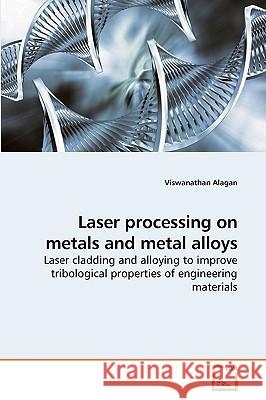Laser processing on metals and metal alloys » książka
Laser processing on metals and metal alloys
ISBN-13: 9783639228380 / Angielski / Miękka / 2010 / 88 str.
An increasing engineering applications demand the materials to possess high strength, wear and corrosion resistance with less cost. In particular, the surface of the materials plays a vital role in the engineering applications. Many surface related failure mechanisms involve wear, corrosion, erosion or high temperature oxidation which could be minimized by modifying the surfaces. To improve the surface properties of the engineering materials, in general there are several conventional methods available such as thermal spraying, oxy-fuel spraying, flame spraying, etc., . However, they exhibit high porosity, non uniform thickness, poor bonding between the coatings and substrate. Laser surface modification techniques such as laser alloying and laser cladding involves rapid heating and cooling rates which produce meta-stable and non-equilibrium phases and offer the possibility of new materials with novel properties. Coating and substrate are metallurgically bonded. Surface properties could be tailored according to the application without sacrificing the bulk characteristics of the structure. Another advantage of this method is to conserve the strategic materials which are expensive
An increasing engineering applications demand the materials to possess high strength, wear and corrosion resistance with less cost. In particular, the surface of the materials plays a vital role in the engineering applications. Many surface related failure mechanisms involve wear, corrosion, erosion or high temperature oxidation which could be minimized by modifying the surfaces. To improve the surface properties of the engineering materials, in general there are several conventional methods available such as thermal spraying, oxy-fuel spraying, flame spraying, etc.,. However, they exhibit high porosity, non uniform thickness, poor bonding between the coatings and substrate. Laser surface modification techniques such as laser alloying and laser cladding involves rapid heating and cooling rates which produce meta-stable and non-equilibrium phases and offer the possibility of new materials with novel properties. Coating and substrate are metallurgically bonded. Surface properties could be tailored according to the application without sacrificing the bulk characteristics of the structure. Another advantage of this method is to conserve the strategic materials which are expensive.











